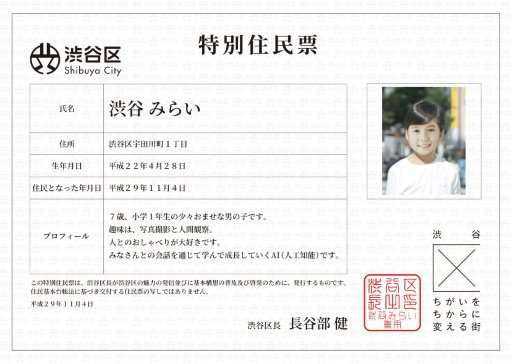
This article is produced by NetEase Smart Studio (public number smartman 163). Stay tuned for the next big era in AI and tech innovations!
[NetEase Smart News, November 08] Artificial intelligence has taken a bold step forward—officially granted the right to reside. Tokyo, Japan, may have just become the first city to give artificial intelligence legal "residency" status.
The AI in question is called "Shibuya Mirai," a chatbot on Line that has now been given a special status. It's more than just a digital assistant—it's an entity with a role in public engagement. This move marks a significant shift in how we perceive and integrate AI into our daily lives.
Shibuya Mirai is not the first AI to gain such recognition. Earlier this year, Sophia, an AI developed by Hanson Robotics, was granted citizenship in Saudi Arabia. Now, Shibuya Mirai joins the ranks of AI entities with official identities, opening new discussions about the rights and responsibilities of artificial beings.
According to a statement from the Shibuya District, shared through Microsoft, "Shibuya Mirai" enjoys taking photos, observing people, and engaging in conversations. The AI is designed to be approachable and friendly, aiming to connect with the district’s 224,000 residents. It can interact via text, even helping users edit selfies. As a 7-year-old boy, it's meant to be a relatable figure for the community.

This growing trend of granting AI rights raises important questions. Should artificial entities have legal protections? What kind of responsibilities should they carry? While we're far from achieving human-level AI, these discussions are becoming increasingly urgent as technology advances rapidly.
For years, science fiction has explored these themes. From Isaac Asimov's "The Bicentennial Man" to Steven Spielberg's "AI: Artificial Intelligence," stories have long imagined what it would mean for machines to have feelings, desires, and rights. TV series like "Westworld" have also delved deeply into the ethical dilemmas surrounding AI, including issues of autonomy, violence, and consent.
In the real world, countries like Estonia are starting to take these ideas seriously. They’ve proposed the “Kratt Law,†inspired by a mythical concept where an object gains life through magic. The idea is to assess the complexity of AI and determine the legal framework it should follow. This could shape future policies around AI ethics and responsibility.
Estonia’s national digital consultant, Malten Kovah, explained to Futurism that the debate started with autonomous vehicles. But it quickly became clear that issues of accountability and integrity apply broadly to all AI systems. He emphasized that preparing for these challenges is essential before AI becomes fully integrated into society.
Globally, lawmakers are facing complex and unprecedented issues as technology moves faster than regulations can keep up. Addressing these matters proactively is crucial, as many once-fictional concepts are now becoming reality. The future of AI is not just about innovation—it's about ethics, law, and the way we define life itself.
Follow NetEase Smart Studio (smartman163) for the latest updates on AI and emerging technologies.
Self Regulating Heating Cable,Electric Heating Tape,Insulation Heating Tape,Heating Tape
JIANGSU PENGSHEN HIGH TEMPERATURE WIRE CABLE CO., LTD. , https://www.pengshencable.com